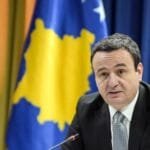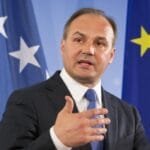Democratization policies in Berlin, Germany, Bodo Weber, in an interview for Sinjali newspaper, has stated that he does not expect the issue of Kosovo’s membership to be on the agenda of the Committee of Ministers of the Council of Europe, which will meet on the 16th and 17th May in Strasbourg.
Weber has stated that this way a negative vote, an unsuccessful vote for Kosovo, would be prevented.
According to him, this has become clear after the Western countries set a condition for Kosovo to take concrete steps for the establishment of the Association of municipalities with a Serbian majority.
He further added that Kosovo’s demonstrated optimism on this issue is based entirely on the formal process of application and conditioning, reports Sinjali.
Commenting on the statement of the Prime Minister, Albin Kurti, who rejected this condition, Weber said that Kurti is formally right, but lacks the political point in this matter.
He added that there are two potential reasons for the failure of Kosovo’s membership, either the government according to him was naive not understanding the political part of the “conditionality”, or they understood it, but thought they could surpass the European capitals and they push them towards support.
Weber said that he does not believe that Prime Minister Kurti is naive.
Do you expect the issue of Kosovo’s membership in the Council of Europe to be on the agenda of the meeting of the Committee of Ministers on May 16 and 17?
Weber: Unfortunately not. It seems that it is definitely clear after the developments and statements of the main actors in the last days that the main European allies of Kosovo, i.e. France, Italy and Germany demand from the Government of Kosovo that the draft statute of the QUINT Association be sent to the Constitutional Court and that the Kurti Government is not prepared to do so. As a result, Kosovo’s application for membership will not be put on the agenda, to avoid a failed vote, which would be an even greater embarrassment for all parties. So, unless there’s some last minute breakthrough in the next two or three days, I just don’t think it’s going to happen.
If this issue is put on the agenda, do you think Kosovo’s membership will be voted on?
Weber: Well, if Kosovo’s application for membership were to be put on the agenda only if Kosovo meets the conditions of these European capitals, in this case yes, there would be a successful vote.
How do you see the recently created situation regarding the issue of establishing the Association?
Weber: As something that was unfortunately fully expected, despite everyone in Kosovo and beyond claiming to be surprised by the move of EU capitals. For months, everyone pretended that Kosovo’s membership application was on track, despite the fact that the government’s bid for membership had been a one-sided move and political dialogue had generally collapsed, damaging relations with key Western allies. of Kosovo. Pristina’s demonstrated optimism was based entirely on the formal application and conditioning process. However, as the last failed application of the Haradinaj Government in 2019 has proven, Kosovo can only succeed when the application is fully coordinated with Kosovo’s allies and when the political dialogue progresses.
How do you comment on the statement of the Prime Minister of Kosovo, Albin Kurti, who rejected this condition, on the grounds that it has nothing to do with the country’s admission to the Council of Europe?
Weber: Prime Minister Kurti is formally right, but missing the political point: As I said, as the last failed application for membership has proven, it is the formal application process and the formal conditions, and then there is the wider political context of the dialogue political, regardless of whether it is fair and meaningful or not. Thus, despite the fact that the European capitals made their political “condition” clear at the end of the process, this should not really have been a surprise. There are two potential reasons for the failure of Kosovo’s membership, either the government was naive in not understanding the political part of “conditionality”, or they understood it but thought they could outwit the European capitals and push them towards support . I do not believe that Prime Minister Kurti is naive.
What do you think Kosovo should do at this point?
Weber: Taking into account the fact that the current dialogue policy, the German-French initiative, the Basic Agreement and the Ohrid Annex have de facto collapsed, also taking into account that in the proposal for the statute of the Association proposed by Quinti there are problematic elements and aspects and also the fact that The West has not given a convincing guarantee to Pristina that would prevent the Association from developing in a direction contrary to the integrity of the Kosovo state, the future of the Serbs and regional stability, I think that Prime Minister Kurti has been well advised not to give up and forward the draft statute to the Constitutional Court of Kosovo. Even if this makes Kosovo’s application for membership in the Council of Europe difficult for the moment.
Do you still think that the European Union and the United States “need to admit that their policy so far has failed”?
Weber: It is quite clear that the German-French initiative has failed. I said it before Banjska. Since Banjska, all capitals and relevant Western actors know full well that this is the case. What is worse, this latest phase in the dialogue has destroyed what little progress was left from a decade of political dialogue, and the status quo in the north has also been destroyed, endangering security and stability. It means that we are almost a year into a phase where the authors of the current dialogue approach are fully aware of its failure, but not ready to admit it. Unfortunately, international politics does not normally work in a way where one admits failure and then reverses course. We hope that the departure of European emissary Lajcak and his American counterpart Escobar and the upcoming change in the European Commission will provide a chance for an urgently needed policy change.
So, do you think that the Association of municipalities with a Serbian majority will be established?
Weber: Not in the near future – and it shouldn’t be, given current conditions. Association is the most misunderstood issue in dialogue. It had a very specific meaning in the context of the original 2012-14 political dialogue, and the initial historic progress it achieved. With the loss of the strategic direction of the dialogue, the issue of the Association naturally stalled. The issue of the Association is a complex issue – it contains very problematic, dangerous elements and aspects, and at the same time it cannot be ignored, because it is closely intertwined with the collective fear of the Kosovo Serbs. For all these reasons, there is only one way to resolve the issue of the Association – within the framework of a final, comprehensive dialogue agreement between the Republic of Kosovo and the Republic of Serbia, including the formal recognition of Kosovo by Serbia.
What do you think is the only choice and path for the normalization of relations between Kosovo and Serbia?
Weber: A full and deep restoration of the EU’s political dialogue and based on a complete turnaround in the West’s policy towards Serbia, in a way that ends the failed policy of the Vucic regime, taking advantage of the provided by Russian aggression against Ukraine.







